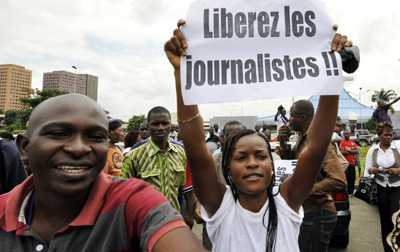WikiLeaks’ publication of tens of thousands of pages of confidential U.S. military documents on the Afghanistan war has drawn a lot of attention, perhaps overshadowing the many, more common cases around the world in which journalists publish stories based on leaked documents. This week, for instance, three journalists in Ivory Coast were found guilty of disclosing confidential judicial information after they published a story that shook the political establishment in this West African nation.
We’re not talking here about the kind of military action reports published by WikiLeaks. The Ivory Coast case centered on a newspaper’s disclosure of a 137-page prosecutor’s report that detailed alleged corruption in the cocoa industry, a key economic sector in this nation, the world’s top exporter of cocoa. For nearly two weeks, the courtroom drama gripped the nation, stirred a debate on freedom of the press, and spotlighted three audacious editors of a fledgling newspaper called Le Nouveau Courrier. “The coffee and cocoa issue is very sensitive in our country. Few journalists dare to touch it,” said Le Nouveau Courrier Editor-in-Chief Saint-Claver Oula. Little wonder. Guy-André Kieffer, a Franco-Canadian journalist, went missing more than six years ago while investigating corruption in the cocoa industry.
In 2007, Ivorian President Laurent Gbagbo ordered an official inquiry into graft in the cocoa industry. State Prosecutor Raymound Tchimou, who oversaw the inquiry, handed his report to Gbagbo in June, a step heralded by Ivorian state television. But the report itself was held back from the public, and Tchimou was reticent on the details. “It seemed a bit odd and it drew our curiosity,” Oula said. After the newspaper got a copy of the report from an unnamed source, it published an in-depth piece on July 13 that described the prosecutor’s findings of embezzlement, over-billing and malfeasance. (Although two dozen people have been imprisoned during the course of the cocoa probe, no cases have been brought to trial as yet.)
Tchimou immediately summoned Oula, along with Le Nouveau Courrier Managing Editor Stéphane Guédé and News Editor Théophile Kouamouo, and demanded they reveal their sources or be thrown into prison for “theft” of official documents. When the trio refused, the prosecutor jailed them and dispatched police to raid the offices of Le Nouveau Courrier. Police came to the newsroom without a search warrant, but carted away Oula’s laptop.
The arrests and raid, in a country where press offenses were made civil matters under 2004 law, stirred unprecedented solidarity among Ivorian journalists. A loosely formed Ivorian Committee for the Protection of Journalists emerged. Last Friday, the group staged a sit-in at the gates of the main courthouse in Abidjan to protest the imprisonment of their colleagues. The gathering was dispersed by police—but not peacefully, according to local news reports.
Ivorian photojournalist Stéphane Goué, a group leader, told CPJ that club-wielding police officers assaulted at least 10 journalists. Police seized the cellphone of journalist Simon Konan of Le Flambeau, and deleted images taken by photojournalists such as Olga Ottro of Le Nouveau Réveil and Koussi Germain of Nord Sud, he said. At least three journalists were injured, including Germain and reporter Sanou Amadou of Nord Sud. Saturday’s edition of daily Nord Sud featured a front page photo of Germain with a bandaged arm and head. Undeterred, leaders of the journalists group planned to ramp up protests if the three Le Nouveau Courrier editors were not freed.
On Monday, came the much anticipated denouement: A judge acquitted the Le Nouveau Courrier journalists of the more serious penal code charges of theft and disclosure of administrative documents. The three were found guilty of disclosing confidential judicial information, a lesser offense covered under the 2004 press law. The judge fined the paper 5 million CFA francs (US$9,800) and ordered it not to publish for 15 days.
These are the types of “leaked document” cases that CPJ monitors regularly in Africa and around the world. They typically involve issues of great local importance; the journalists who publish these stories are often jailed for days or weeks at a time. In many of these cases, government officials vaguely cite national security as the reason for their secrecy and the justification for their repression. But local journalists say narrow political interests typically motivate these prosecutions.
WikiLeaks’ publication of the Afghan documents is a world away in most respects. But there may be one parallel. After punishing the press, Ivorian prosecutor Tchimou eventually turned his attention to his own office, charging his spokesman, Patrice Pohé, with leaking the document. Pohé was acquitted, but the development underscored an important point for Ivorian journalists: The press has a duty to uncover what is hidden, while the government is responsible for addressing its own leaks.
On Monday in Washington, a reporter asked White House spokesman Robert Gibbs what the WikiLeaks’ disclosure “says about the ability of the [U.S.] government to protect confidential information if a breach like this can occur?” Gibb’s response? “Well, I think there is no doubt that this is a concerning development in operational security.”
